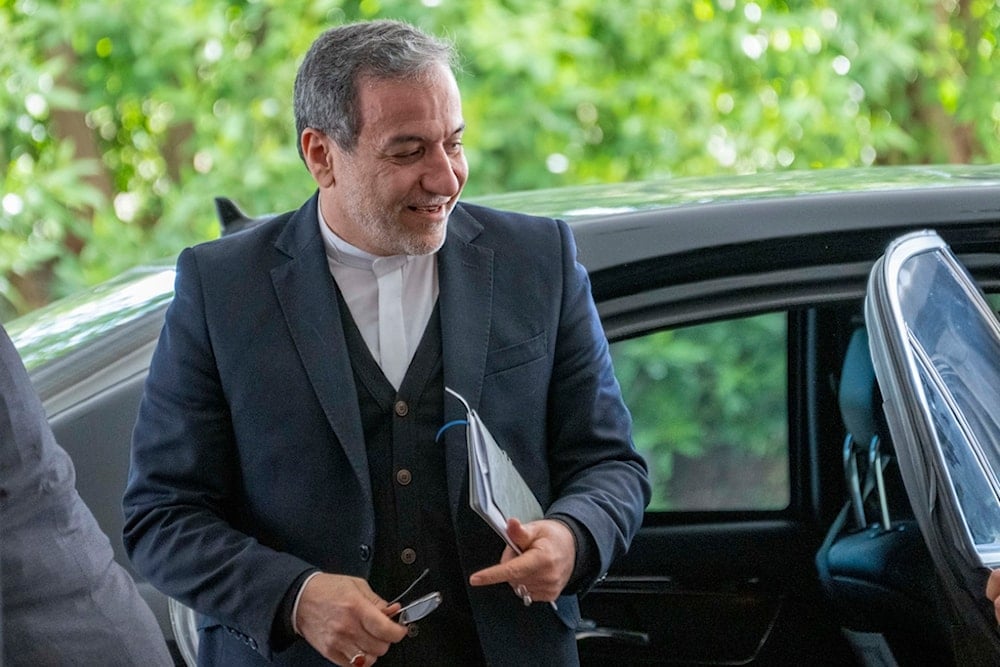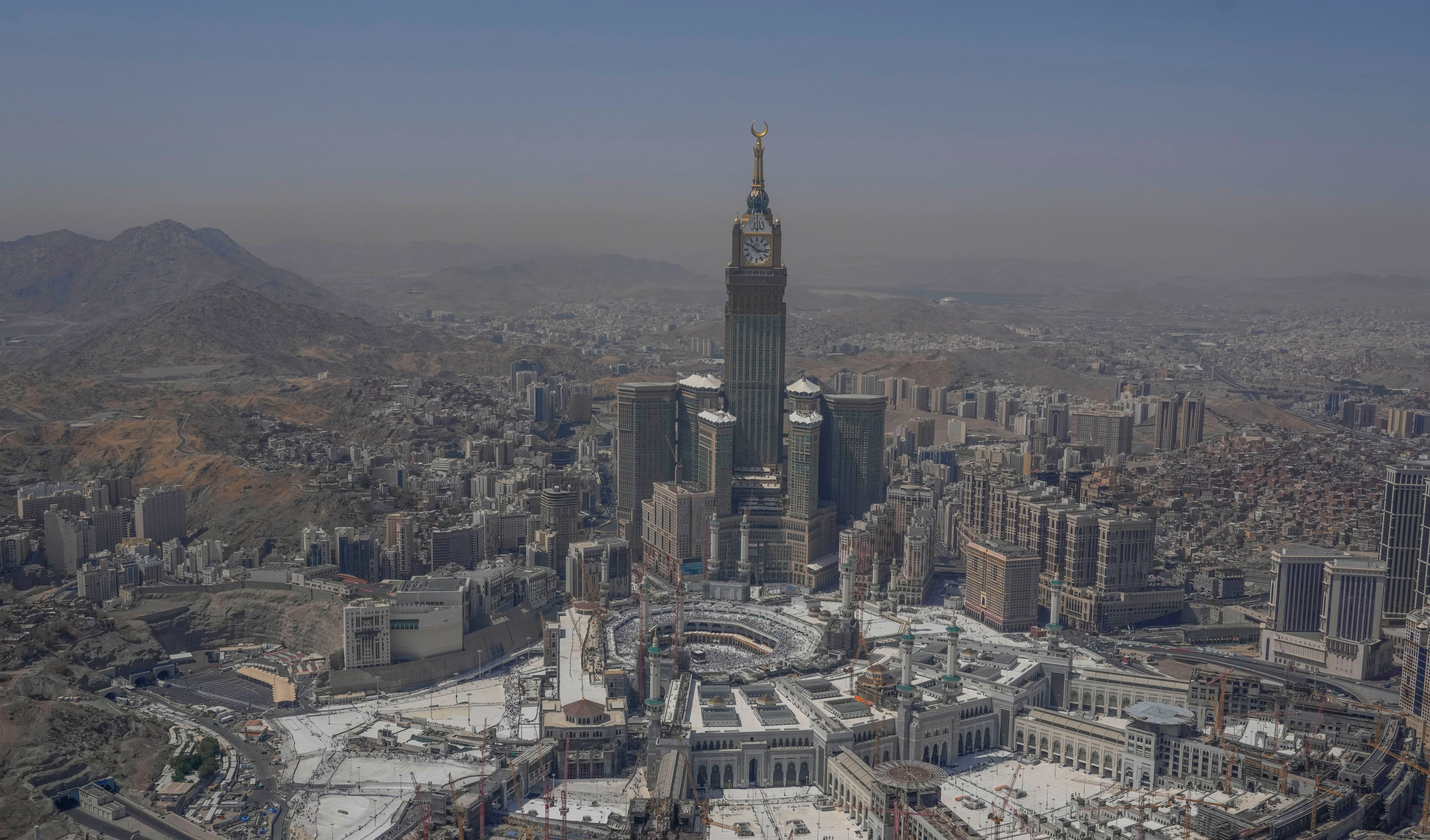Iran reaffirms 'brotherly' ties with Saudi Arabia despite Hajj arrest
Iran’s Foreign Minister emphasizes the importance of Iran-Saudi Arabia relations following the arrest of an Iranian citizen in Medina during the Hajj pilgrimage.
-

Iranian Foreign Minister Abbas Araghchi arrives to meet his Iraqi counterpart Fouad Hussein during his visit to Baghdad, Iraq, Friday, Dec. 6, 2024 (AP)
Tehran is committed to maintaining its "brotherly relations" with Saudi Arabia, affirmed Iran’s Foreign Minister Abbas Araghchi on Thursday, emphasizing that no incident, including the recent arrest of an Iranian citizen in the Saudi city of Medina, will derail the path of diplomacy and cooperation between the two sides.
Addressing concerns surrounding the arrest during the annual Hajj pilgrimage, Araghchi stated that relations with Saudi Arabia remain a top priority for Iran’s foreign policy.
"Saudi Arabia has a very important position in Iran's foreign policy, and we will continue our brotherly relations and not allow any disruption in these relations," the Iranian top diplomat indicated.
He added that the Iranian government was actively monitoring the situation and working to ensure it does not impact the broader diplomatic efforts between the two countries.
“I am in contact with my colleagues in the Hajj Organization to ensure that there are no disruptions to the dispatch of Iranian pilgrims to Saudi Arabia,” the Iranian foreign minister said.
Iranian citizen arrested in Medina
The arrest of an Iranian pilgrim in Medina has triggered heightened diplomatic activity. Hajj, one of the Five Pillars of Islam, brings millions of Muslims to Mecca each year. The incident raised concern in Tehran, given the sensitivities involved in ensuring a smooth pilgrimage for Iranian citizens.
Iranian officials have stressed the need for calm and careful management of the situation to prevent any escalation, while affirming the importance of uninterrupted Hajj participation.
Iran-Saudi diplomatic restoration
In March 2023, Iran and Saudi Arabia signed a landmark agreement in Beijing to restore diplomatic ties after years of strained relations. The Chinese-brokered deal included commitments to reopen embassies and respect each other’s sovereignty.
The accord marked a significant shift in Middle Eastern diplomacy, paving the way for renewed cooperation on a range of regional issues. Both nations have since taken cautious but deliberate steps toward reconciliation, and Iranian officials have consistently voiced a desire to protect this progress.
Iran urges unity during Hajj as Saudi-Iran ties continue to improve
The head of Iran's Hajj and Pilgrimage Organization, Ali Reza Bayat, has called on Iranian pilgrims to show full respect while in Saudi Arabia and avoid any actions that could “provoke division, fragmentation, or discord” during the upcoming Hajj season.
Bayat stressed the importance of preserving Islamic unity through pilgrim behavior, urging vigilance to avoid conduct that could be misinterpreted or used to harm inter-Muslim relations.
He also called on Saudi authorities to treat pilgrims with tolerance and sensitivity.
This year's pilgrimage season carries additional significance as it marks the first time since 2015 that Saudi Arabia has resumed direct flights to Iran to facilitate the travel of Iranian pilgrims. Over 225 flights are scheduled to carry Iranian nationals to the holy sites in the coming weeks.
Renewed Iran-Saudi engagement
Bayat’s comments come in the broader context of ongoing efforts to restore full diplomatic engagement between Tehran and Riyadh.
In April, Iranian Leader Sayyed Ali Khamenei received Saudi Defense Minister Prince Khalid bin Salman in Tehran. During the high-level meeting, Prince Khalid delivered a message from Saudi King Salman and expressed the Kingdom’s desire to expand cooperation “across all areas.”
Sayyed Khamenei welcomed the move, saying that stronger ties between Iran and Saudi Arabia “will benefit both nations” and emphasized that “hostile intentions” against the rapprochement must be overcome.
Highlighting the importance of regional solidarity, Khamenei added, “It is far better for brothers to help each other than to rely on outsiders.”
The Hajj pilgrimage now serves as a key arena for translating diplomatic progress into people-to-people engagement, as both sides cautiously navigate a post-detente phase marked by regional turbulence but growing interest in cooperation.
Read more: Iran, Oman deepen economic and political cooperation

 4 Min Read
4 Min Read










